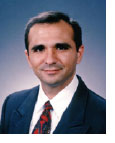|
TRWG Convenes National Roundtable
Last week, the Translational Research Working Group (TRWG) took the next major step in its 18-month effort toward future NCI investments in translational research (TR). TRWG co-chair Dr. Ernie Hawk, director of the Office of Centers, Training and Resources, and 62 other TRWG members invited 140 experts and stakeholders to Phoenix for a roundtable discussion. Their task was to recommend how NCI can help improve the efficiency, productivity, and speed of translational progress.
TRWG conducted a review of NCI's current investments in TR and shared early analyses, which suggested that more than $1.5 billion went to fuel TR in FY 2004, with funds distributed across most divisions and programs. "Clearly," noted Dr. Hawk, "communication, coordination, and collaboration - within and beyond NCI - are essential to realize the full potential of NCI's TR portfolio."
In breakout discussions, the roundtable analyzed TR from three perspectives: translational pathways to clinical goals, populations that researchers hope to benefit, and crosscutting themes. Participating were representatives from academia, the pharmaceutical and device industries, advocacy organizations, major cancer research organizations, federal agencies, and British scientists who recently led a similar effort in the United Kingdom. These discussions will be the basis for draft recommendations to be released for public comment in the spring.
Researchers Discuss Biomarker Discovery at Annual U.S.-Japan Meeting
The discovery of biological markers using genomic and proteomic technologies headlined the Ninth Annual U.S.-Japan Cellular and Gene Therapy Conference held February 23 at NIH. Thirteen scientists presented their data, including Dr. Jeffrey Green of CCR's Transgenic Oncogenesis Group and Dr. Jun Wei of NCI's Pediatric Oncology Branch. Dr. Green discussed conserved genetic networks in mouse and human mammary cancers and the added value of the mouse in biomarker discovery. In a talk entitled "Translational Genomics in Cancer," Dr. Wei presented research on developing biomarkers for distinguishing neuroblastoma from other cancers and for predicting patient outcomes.
 Rodriguez Joins Proteomics Technologies Program
Rodriguez Joins Proteomics Technologies Program
Dr. Henry Rodriguez, who has extensive experience in cancer research, free-radical biology, technology development and assessment, research programs, and systems design, recently joined NCI's Office of Technology and Industrial Relations as the director of the Cancer Proteomics Technologies program. As a postdoctoral candidate, he identified molecular mechanisms by which potent carcinogens induce the mutations that turn normal cells into tumor cells. He also focused on the development of new measurement techniques to understand how free radicals damage DNA and their role in cancer development and age-related diseases.
Dr. Rodriguez has led several programs in biological standards development at the National Institute of Standards and Technology, including protein detection and measurement platforms. He earned his doctorate in cell and molecular biology from Boston University and holds an M.B.A. from Johns Hopkins University School of Business and Management.
At NCI, Dr. Rodriguez will facilitate the implementation of the clinical proteomic technologies initiatives that seek to develop and assess proteomic technology platforms for cancer research.
TCGA Biospecimen Core Resource RFP Is Issued
NCI and the National Human Genome Research Institute recently launched The Cancer Genome Atlas (TCGA) Pilot Project, a 3-year study aimed at performing a comprehensive genomic analysis for a small number of select tumor types. The pilot project is designed to assess the feasibility of a larger-scale effort, with specific emphasis on the ability to identify genomic changes that may inform new clinical interventions in cancer diagnosis, treatment, and prevention. As part of the pilot project, NCI will establish a centralized Biospecimen Core Resource to acquire material from existing cancer tissue repositories. This facility will perform pathology verification on the biospecimens and distribute quality-assured genomic material for analysis to TCGA cancer genome characterization centers and genome sequencing centers.
NCI has issued a request for proposals (RFP) to identify a contractor to build the Biospecimen Core Resource. NCI expects to hold a preproposal conference for potential applicants on March 16. Questions about this RFP should be submitted by e-mail to jlewis@mail.ncifcrf.gov or by fax to 301-228-4037.
|